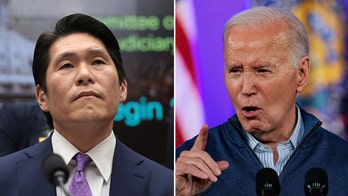For the first time, the federal government is regulating big-rigs, RV's, and tractor-trailers in much the same way it's held car makers to rigorous fuel efficiency standards for decades. But a group of California truckers contends the regulations will drive them right out of business -- and has filed suit to block them.
The Environmental Protection Agency is ordering large trucks and buses to reduce greenhouse gas emissions by up to 20 percent and overhaul engine design starting with models built in 2014. Most operators will need to spend thousands upgrading their rigs or buying new vehicles, with prices starting at $50,000 and going up from there, depending on the model.
Even so, the regulations have the support of the large and powerful American Trucking Association.
"We have never been inclined to be supportive of federal involvement and regulations in our industry," said Bill Graves, president and CEO of the ATA. "But our experience in this case is one where we have to admit that the federal government did a really fine job of working collaboratively with all partners in this, to come up with what we think is a reasonable and fair rule."
Smaller owner-operators like Sacramento trucker Robert McClernon argue the opposite.
"With the cost of the new equipment that they're requiring, and the oversight of the government in every part of my business, I can't afford to be in business," he claimed.
McClernon is among a group of California trucking outfits challenging the Obama administration in federal court. The lawsuit claims the EPA failed to properly submit the regulations to a blue ribbon panel called the Science Advisory Board, as is required. The SAB is a group of top scientists who've been empowered by federal law to review new regulations that the EPA proposes to issue under the Clean Air Act.
"The government has to comply with the law just like the rest of us do, and when the government's rule making creates these kinds of economic dislocations for small business, we're going to make sure we hold EPA's feet to the fire," said McClernon's lawyer, Ted Hadzi-Antich with the Pacific Legal Foundation.
The EPA argues it posted all relevant information on its website, providing access for scientific and peer review. But critics say that's not good enough, and contend the new greenhouse gas rules are less about clean air, and more about the big trucking fleets pushing smaller operators out of the way.
"This is using the government as a bully pulpit to put me out of business so they can take over and get more market share," says McClernon.
The ATA's Bill Graves denies that's the case, and argues the new regulations will lead to a major goal for the transportation industry -- lower fuel costs.
"The rule is about being more fuel efficient. Over the long haul, this has got to be positive for anybody in the trucking industry," he says.
A court may decide whether that's true, and this legal fight is just beginning to unfold. Depending on the outcome, consumers could be hit hardest -- through higher prices for goods delivered by fewer trucks.





